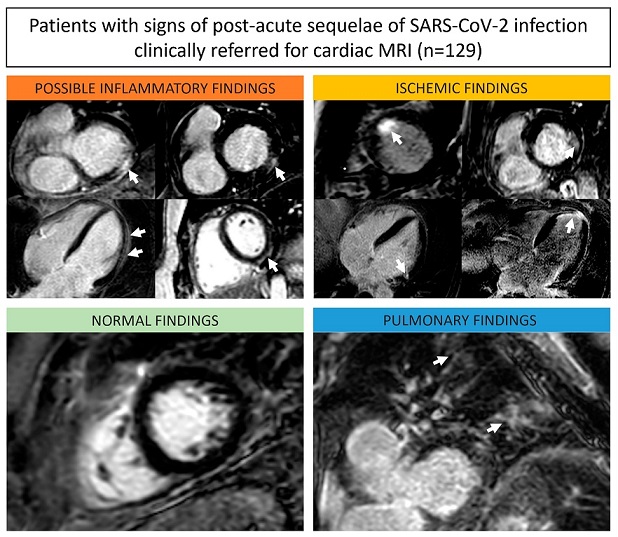BREAKING NEWS! German Study Find That 30 Percent Of Individuals With Long COVID Have Non-Ischemic Myocardial Fibrosis!
Medical News - Non-Ischemic Myocardial Fibrosis – Long COVID Jun 26, 2023 1 year, 9 months, 3 weeks, 3 days, 7 hours, 46 minutes ago
Cardiac MRI Findings In Patients Clinically Referred for Evaluation Long COVID Reveals Alarming Findings!
Medical News: A recent study led by researchers from the University Medical Center of the Johannes Gutenberg-University Mainz in Germany has made a stunning discovery about the long-term effects of COVID-19. The study found that a staggering 30 percent of individuals with Long COVID are suffering from a potentially life-threatening condition known as non-ischemic myocardial fibrosis.
 Representative late gadolinium enhancement (LGE) images of different study patients including subepicardial LGE indicating post-inflammatory fibrosis (upper left box, orange), subendocardial LGE indicating ischemic myocardial infarction (upper right box, yellow), normal myocardium (bottom left, green), and an example with diffuse enhancement of the lung, indicating pulmonary abnormalities (bottom right, blue). White arrows indicate findings of the respective type.
Representative late gadolinium enhancement (LGE) images of different study patients including subepicardial LGE indicating post-inflammatory fibrosis (upper left box, orange), subendocardial LGE indicating ischemic myocardial infarction (upper right box, yellow), normal myocardium (bottom left, green), and an example with diffuse enhancement of the lung, indicating pulmonary abnormalities (bottom right, blue). White arrows indicate findings of the respective type.
Non-ischemic myocardial fibrosis is a condition characterized by the presence of scar tissue in the heart muscle, which can lead to heart failure, arrhythmias, and even death. The findings of this study raise serious concerns about the long-term cardiovascular complications of COVID-19 and shed light on the severity of the post-acute sequelae of SARS-CoV-2 infection (PASC).
This comprehensive study, conducted over a two-year period, involved two prestigious tertiary care hospitals in Germany and included 129 patients who were referred for cardiac MRI due to clinical evidence of PASC. The researchers excluded patients with pre-existing cardiac conditions to focus solely on the effects of COVID-19 on the heart.
The results of the study were both surprising and alarming. While 57 percent of the patients showed normal cardiac results, indicating a potential recovery from the infection, a significant portion of the cohort displayed signs of non-ischemic myocardial fibrosis. This finding is particularly concerning as it surpasses the prevalence of such fibrosis in the normal adult population.
Dr Moritz C. Halfmann, the lead researcher of the study from the University Medical Center of the Johannes Gutenberg-University Mainz, expressed his concern over the implications of these findings. He told Thailand
 Medical News
Medical News, "We were astonished to discover that nearly one-third of the individuals with Long COVID exhibited signs of non-ischemic myocardial fibrosis. This suggests that a history of myocarditis, inflammation of the heart muscle, may be a contributing factor to the persistent symptoms experienced by these patients."
While COVID-19 is primarily known as a respiratory illness, mounting evidence indicates that it can lead to severe cardiovascular complications. The study's findings highlight the need for further research into the long-term effects of COVID-19 and the development of effective treatment strategies for individuals suffering from Long COVID.
The prevalence of cardiovascular sympt
oms in Long COVID patients has varied widely in previous studies, likely due to inconsistent inclusion criteria and varying definitions of myocardial inflammation. However, this study sought to address these issues by strictly adhering to established international guidelines for the detection of myocardial inflammation.
It is important to note that this study focused solely on patients referred for cardiac MRI, making the findings more applicable to real-world scenarios. The researchers followed optimized cardiac MRI protocols and evaluation techniques, ensuring the accuracy and reliability of the results.
Dr Halfmann emphasized the significance of these findings for patient care and treatment. "Our study highlights the importance of cardiac MRI in the evaluation of patients with persistent cardiorespiratory symptoms after COVID-19. By identifying signs of non-ischemic myocardial fibrosis, we can potentially offer targeted interventions and therapies to improve the quality of life for these individuals."
As the world continues to grapple with the ongoing COVID-19 pandemic, it is crucial that we remain vigilant in our understanding of the long-term effects of the virus. This German study serves as a wake-up call, urging healthcare professionals and researchers worldwide to prioritize the investigation of cardiovascular complications in Long COVID patients.
The implications of these findings extend far beyond the realm of medical research. In the face of this groundbreaking research, it is crucial that governments, healthcare organizations, and communities around the world unite to combat the long-term effects of COVID-19. Only through collective action can we mitigate the impact of this global health crisis.
The study findings were published in the peer reviewed journal: Diagnostics.
https://www.mdpi.com/2075-4418/13/13/2172
For the latest
Medical News, keep on logging to Thailand Medical News.
